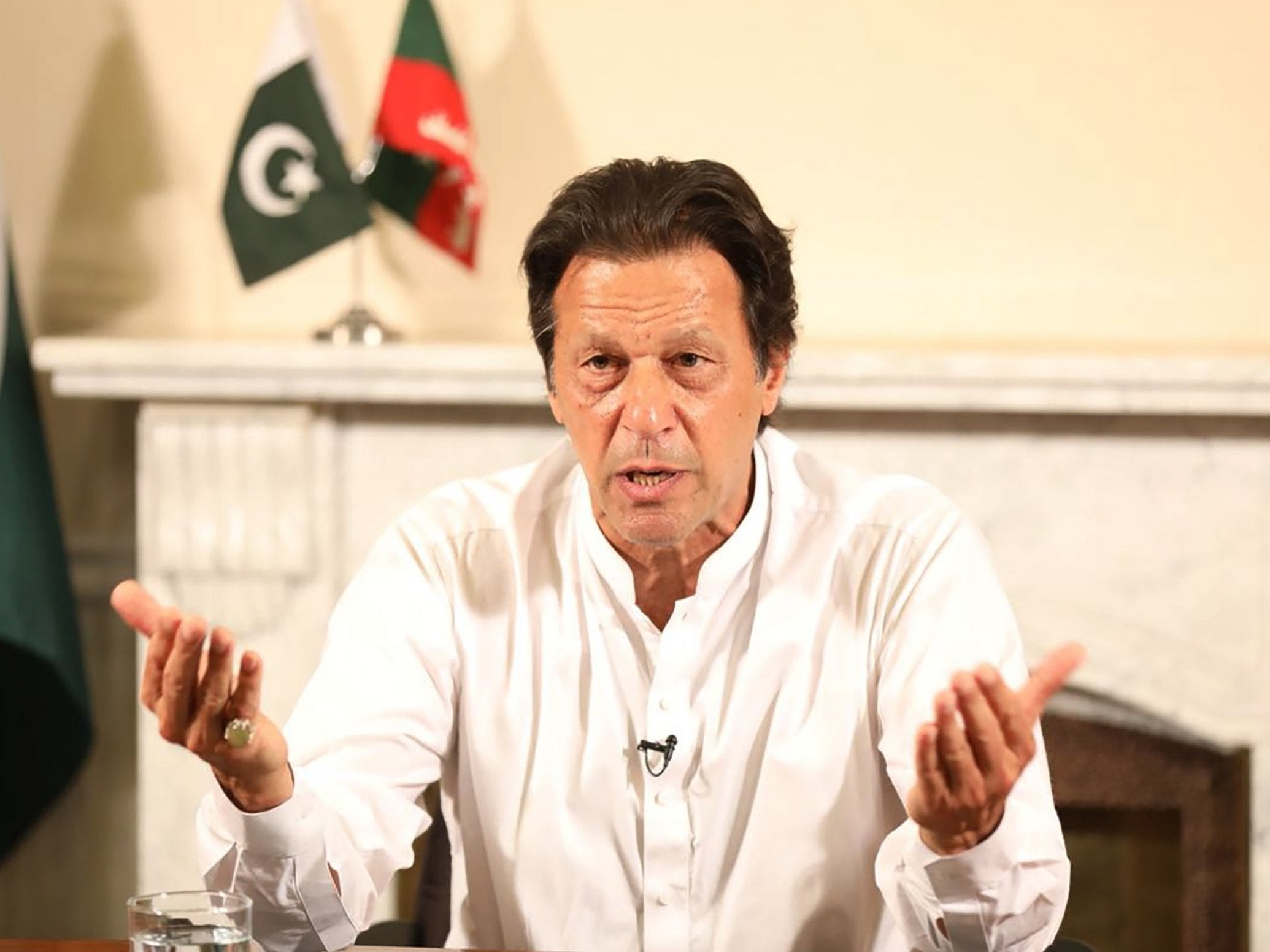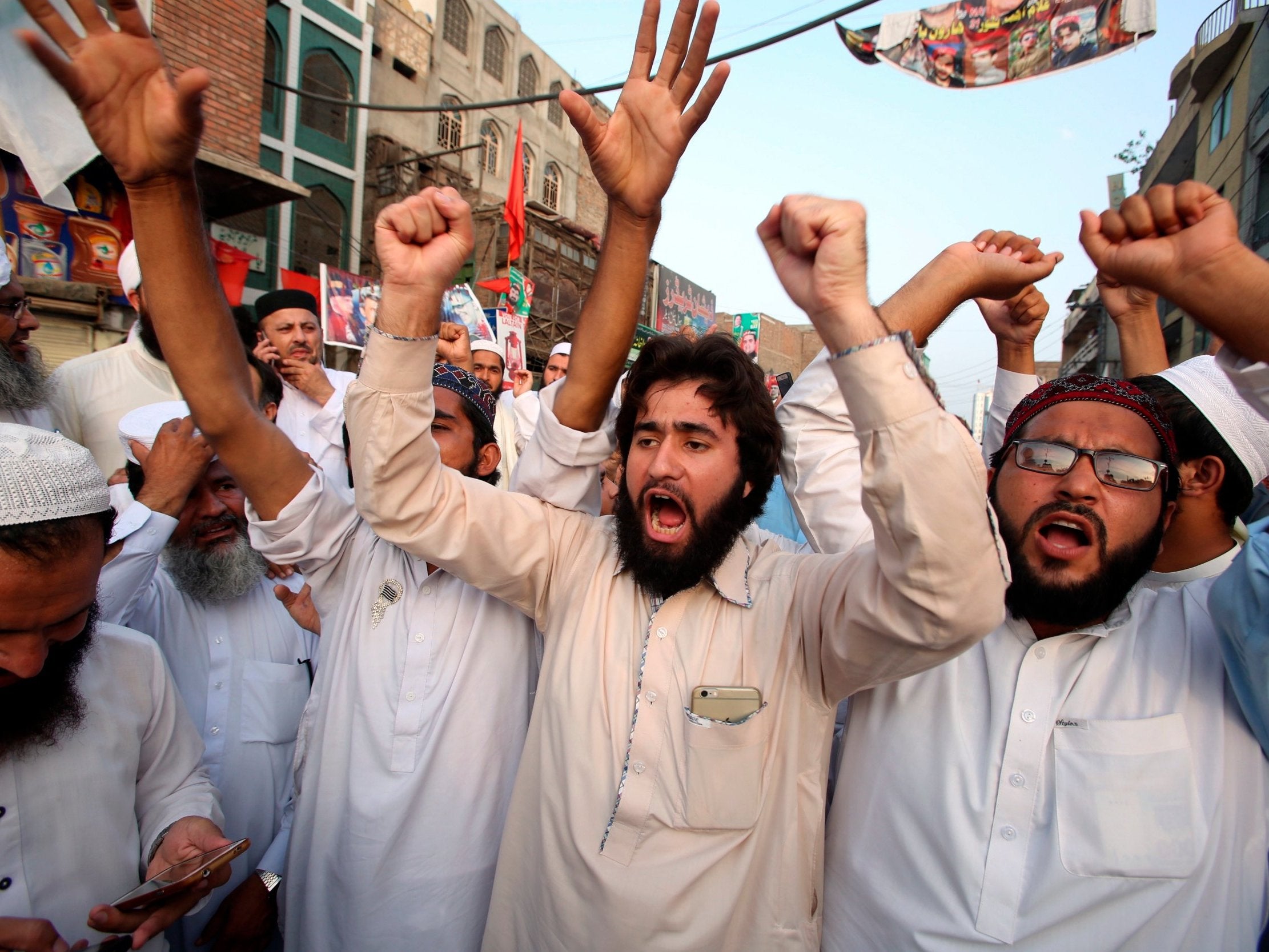Pakistan election: Imran Khan begins coalition talks as opposition parties protest 'rigged' vote
Discussions begin with smaller parties and independents as likely new PM rules out other two major groups, calling them corrupt

Your support helps us to tell the story
From reproductive rights to climate change to Big Tech, The Independent is on the ground when the story is developing. Whether it's investigating the financials of Elon Musk's pro-Trump PAC or producing our latest documentary, 'The A Word', which shines a light on the American women fighting for reproductive rights, we know how important it is to parse out the facts from the messaging.
At such a critical moment in US history, we need reporters on the ground. Your donation allows us to keep sending journalists to speak to both sides of the story.
The Independent is trusted by Americans across the entire political spectrum. And unlike many other quality news outlets, we choose not to lock Americans out of our reporting and analysis with paywalls. We believe quality journalism should be available to everyone, paid for by those who can afford it.
Your support makes all the difference.Pakistan's likely new prime minister Imran Khan opened coalition talks with at least one smaller party and independent politicians on Saturday, a spokesman said, after the announcement of full results of an election disputed by rivals.
Mr Khan's party did better than expected to win 16.86 million votes, trouncing the party of jailed former premier Nawaz Sharif, which finished second with 12.89 million and said on Saturday that a party member had been killed.
But the 116 seats won by Khan's lawmakers were not enough to give him a majority in the 272-seat National Assembly without coalition partners, and he has ruled out both of the other two major parties, calling them corrupt.
Officials from Mr Khan’s Pakistan Tehreek-e-Insaf (PTI), or Pakistan Movement for Justice, party said they were in talks with independents and at least one other political party to form a coalition government.
PTI leaders who have won more than one seat will have to give up additional seats as the law allows an individual to retain only one.
This means that the party will have to rely on independents as well as parties like the PML-Q, Balochistan Awami Party (BAP) and Grand Democratic Alliance (GDA) in addition to its natural ally, Sheikh Rashid, to be able to form the next government
"We are pretty much there in the National Assembly...talks are going on with MQM as well," said Faisal Javed Khan, a senior PTI spokesman.
The Muttahida Qaumi Movement (MQM) has dominated politics in the port megacity of Karachi for decades, and won six seats in the general election after splitting with its longtime leader, Altaf Hussain.
The PTI spokesman said Mr Khan was expected to take the oath as prime minister around 14 August, Pakistan's independence day.
PTI spokesman Naeem Ul Haq told a news conference that the party would also form a government in the most populous province, Punjab, and there would "good news" by Sunday.
In Khyber Pakhtunkhwa province, PTI was the single largest party with 66 out of 97 provincial assembly seats.
In the Sindh assembly, Pakistan Peoples Party (PPP) held on to 76 of 130 seats. In Balochisan, BAP won 13 seats out of the 65 while Muttahida Majlis-e-Amal (MMA) was in second place with nine. Who will eventually form the government in Balochistan is unclear as the BNP, BNP-Awami, Hazara Democratic Party (HDP) have won six, three and two seats respectively, while PTI has won four.
In Punjab, Pakistan's largest province, the Muslim Leaque took 129 out of 295 seats with the PTI close behind with 123, while 28 independent assembly members will play a potentially vital role in forming the government.
"We will definitely form our government in Punjab as we are in contact with 21 independent candidates," PTI spokesman Fawad Chaudhary said
The poll has been marred by long delays in counting and complaints of rigging by the Pakistan Muslim League-Nawaz (PML-N) party.
The party’s spokesman, Muhammad Mehndi, told The Independent the "majority” of the elected members were “in favour of boycotting the oath of the assembly” and backed agitating against the election. "There is no other opinion except that election is rigged," he said.

Some of the smaller religious parties are threatening street protests if the poll is not re-run.
"We have decided to organise a movement to press for fresh elections, as the 'manipulated' results are not acceptable to us," MMA president Fazlur Rehman said.
PML-N leader Shehbaz Sharif said on Saturday that he was "outraged" by the killing of a party member in the northern city of Mansehra and that demanding a recount was a party's legal right. He did not specify when the party member was killed.
"PML-N is a peaceful national political party and fear & intimidation can't suppress our rights," Mr Sharif tweeted.
Mr Khan has offered to investigate any claims of irregularities in the wake of Wednesday's poll, which Mr Sharif's PML-N and several other parties allege was skewed in favour of the former cricket hero by Pakistan's powerful military.
European Union observers were critical of the political climate in the run up to the vote, saying that some parties had been disadvantaged. In their preliminary findings, the observers said the electoral process was "not as good" as the 2013 election and campaign week featured a "lack of equality" that meant it was not a level playing field for all parties. The US voiced similar concerns.
"We have concluded there was a lack of equality of opportunity," German MEP Michael Gahler said.
"A number of violent attacks, targeting political parties, party leaders, candidates and election officials, affected the campaign environment.
“Most interlocutors acknowledged a systematic effort to undermine the former ruling party through cases of corruption, contempt of court and terrorist charges against its leaders and candidates.”
Mr Khan's 116 seats put him short of the 137 required for an assembly majority, meaning he is likely to need a coalition with religious parties and independents to form a government.
Two newly formed small parties are seen as being open to an alliance with Mr Khan's PTI.
The GDA, a new alliance in Sindh province, has two seats.
BAP, another new group formed by a number of seasoned political names from the southwesterly Baluchistan province, picked up four seats.
The Election Commission of Pakistan (ECP) on Saturday released results for 270 seats, with elections in two seats postponed. Several were being recounted.
The coalition arithmetic is slightly complicated by the fact that a further 70 seats, most reserved for women and members of non-Muslim minorities, are allocated to parties on the basis of their performance in the contested constituencies. Once those seats are added in, any coalition will need at least 172 seats.
Additional reporting by Reuters
Join our commenting forum
Join thought-provoking conversations, follow other Independent readers and see their replies
Comments